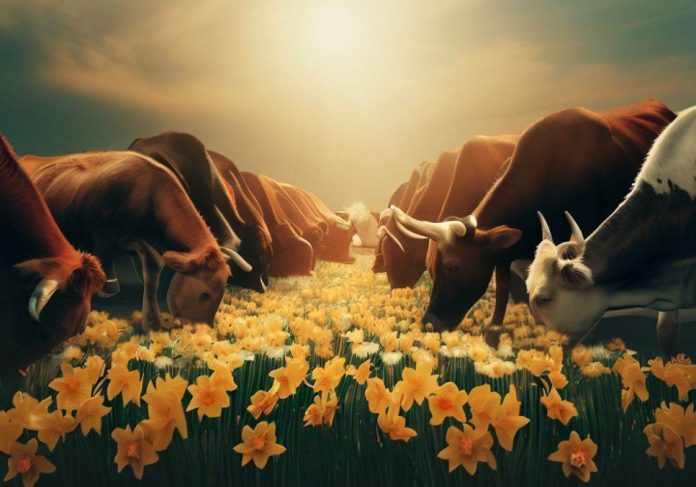News in brief: Daffodils added to livestock feed reduce methane in artificial cattle stomachs by 96%, potentially leading to a 30% reduction in methane emissions from real ones, according to a team of researchers at Scotland’s Rural College. This breakthrough could significantly contribute to more sustainable livestock farming and help address the challenge of greenhouse gas emissions, particularly methane, which has a high warming potential.
Daffodils could provide the key to more sustainable livestock farming, according to latest scientific reports. Adding an extract from the flowers to livestock feed reduced methane in artificial cattle stomachs by 96%, the team said.
The researchers, who are working out of Scotland’s Rural College, hope that when tried in real cattle, it could reduce methane emissions by at least 30%.
They are starting a four-year trial programme in at farms around the United Kingdom. The team is also working closely with farmers to develop the science behind the new animal feed.
Kevin Stephens, a local farmer in Wales, is part of the team developing the new technology. He said that this could be a major game changer for the livestock industry. His farm, in Powys, already grows daffodils for Alzheimerâs drugs. However, with the discovery, he said that he could not miss the opportunity.
For farmers like Stephens, finding a way to farm more sustainably is important. Already, in neighbouring Ireland, there are rumours of a government plan to cull 200,000 cattle to meet climate pledges.
Professor Jamie Newbold, a professor of animal science at Scotland’s Rural College, hopes the project will be part of a solution to methane emissions.
He said the new project has three main stages. The first stage is developing a supply chain of daffodils and extraction of chemicals from them. The second stage is concerned primarily with testing to ensure the additive is safe to both animals and humans.
The final stage includes working with farmers and partners across England and Wales to prove the additive is effective in reducing methane production and feed costs for dairy cattle.
The project is vital because greenhouse gases and global warming is a major challenge. Methane has 80 times the short-term warming potential of carbon dioxide, making it one of the most potent greenhouse gases.
Ruminant livestock can produce 250 to 500 litres of methane per day. The beef and dairy cattle âindustry is responsible for about 14.5% of the worldâs greenhouse gas emissions and more than half of this gas is methane. Scientists estimate that half of the warming occurring over the following two decades will be caused by the increasing amounts of methane in the atmosphere.



